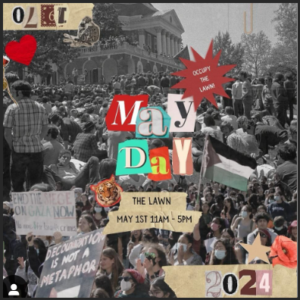 by James A. Bacon
by James A. Bacon
Virginia Tech arrested two dozen or more students Sunday night while dispersing an “encampment” similar to other anti-Israeli protests spreading around the country, according to media reports.
The gathering of several hundred people on the lawn of the Graduate Life Center was “not a registered event consistent with university policy,” Tech officials stated in explaining its actions.
“Given these actions by protesters, the university recognized that the situation had the increasing potential to become unsafe,” the university statement said. First, protesters were asked to disperse voluntarily. Then university police approached those who did not comply, warned them that they would be charged with trespassing, and asked them again to leave. At 10:15 p.m., police gave protesters five minutes to disperse. Those who remained were subject to arrest.
Tech President Timothy Sands deserves kudos for handling a difficult situation in a firm but restrained manner.
University of Virginia President Jim Ryan likely will face a similar test. Left-wing groups at UVA have announced a May Day event Tuesday (April 30, the day before May Day) on the Lawn to show commitment to “Palestinian Liberation.”
A militant group calling itself Dissenters posted the following on its Instagram account:
During the “May Days” strike of 1970, UVA students announced “Freedom Day” to rally students together in their opposition to the U.S.’s imperialist war in Vietnam. This May Day, Dissenters and the UVA Apartheid Divest Coalition are declaring a day-long liberated zone on the lawn in solidarity with the Palestinian people to call for an END to occupation and an end to our institutions’ complicity in genocide. Show out for a day of community & solidarity and to reaffirm our community’s commitment to Palestinian Liberation. DISCLOSE! DIVEST! WE WILL NOT STOP! WE WILL NOT REST!
As part of a national Boycott, Divest, Sanctions movement, UVA students voted in a referendum (with about 30% of the student body participating) that called upon UVA to divest from its endowment any investments doing business in Israel. The UVA Apartheid Divest Coalition led that initiative.
President Jim Ryan has incurred the wrath of UVA’s left-wing element for not endorsing the divestment resolution, which has no binding authority on the university. Josh Rosenberg, president of the Students for Justice in Palestine, pointedly criticized Ryan for his divestment stance during a “die in” protest earlier this month. By declaring its intention to create a “liberated zone on the lawn,” the Dissenters have signaled a possible desire to go beyond rallies and protests lasting an hour or two and become more confrontational.
At the same time, others will be watching to see how rigorously Ryan enforces the Student Code of Conduct, which describes behavior generally prohibited to enrolled students at UVA. Among eleven standards listed, the Code prohibits:
- Intentional disruption or obstruction of teaching, research, administration, disciplinary procedures, other University activities, or activities authorized to take place on University property;
- Unlawfully blocking or impeding normal pedestrian or vehicular traffic on or adjacent to University property;
- Disorderly conduct on University-owned or leased property or at a University-sanctioned function. Disorderly conduct is defined to include but is not limited to acts that breach the peace, are lewd, indecent, or obscene, and that are not Constitutionally protected speech;
- Failure to comply with directions of University officials acting under provisions 1-11 set above. This shall include failure to give identity in situations concerning alleged violations of sections 1-11.
The pattern at many universities during the wave of pro-Palestinian protests has been for gatherings to begin peacefully in an orderly manner and then to deteriorate over time, devolving into heated antisemitic rhetoric and occasional violence. There is evidence that agitators from outside the universities have stoked tensions.
Leadership at Columbia University and other northern universities allowed the situation to spiral out of control. Sands at Virginia Tech appears to have handled the challenge well, although he may have benefited from the fact that Tech’s student body is more centrist politically than most other institutions, and that Blacksburg is remote from Arab and Muslim communities that have contributed to the worst agitation.
Ryan faces a different situation at UVA. Charlottesville is home to a militant leftist community — much larger, I dare say, than Blacksburg, which is in the heart of red-state country. Those militants also maintain close connections to leftist groups in Richmond and Virginia Commonwealth University, and Charlottesville is a relatively short ride from Northern Virginia, a center of militant Muslim activity. There is a significant risk that the May Day event could be infiltrated by outside pro-Palestinian radicals who could care less about UVA values or UVA’s reputation.
The Jefferson Council will be watching closely. I’m sure others will be as well.


